Kurdistan Chronicle Issue 22: A Tapestry of Regional Affairs and Cultural Heritage
A Richly Woven Narrative of Kurdistan’s Role in Diplomacy, Economy, and Tradition
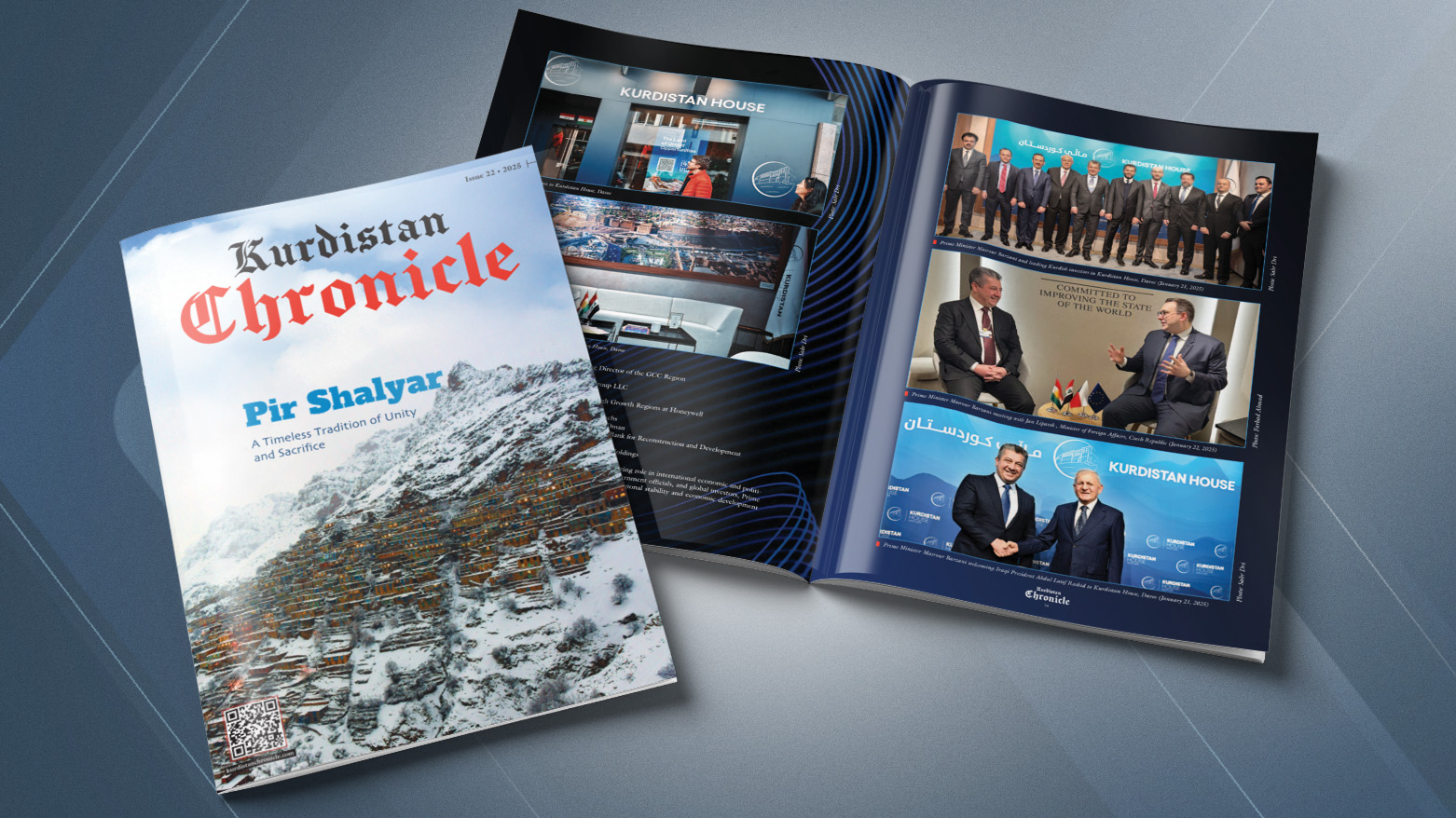
ERBIL (Kurdistan24) – The 22nd issue of the Kurdistan Chronicle is a comprehensive reflection of the Kurdistan Region’s dynamic role in diplomacy, economic strategy, and cultural preservation. This latest edition offers a deep dive into the most pressing political discussions, economic developments, and artistic endeavors shaping Kurdistan’s present and future.
With a blend of investigative journalism, exclusive interviews, and cultural features, the magazine presents a vivid picture of Kurdistan’s evolving landscape.
PM Barzani at Davos: A Voice for Global Stability (Pages 10-15)
One of the central highlights of this issue is Prime Minister Masrour Barzani’s participation in the World Economic Forum in Davos, Switzerland. The Kurdistan House, established at the forum, provided an essential space to showcase investment opportunities, diplomatic initiatives, and Kurdistan’s growing role in regional stability.
In high-level meetings with global leaders, including UN Secretary-General António Guterres and the Prime Ministers of Belgium, the Netherlands, and Croatia, Barzani emphasized Kurdistan’s strategic importance in fostering economic growth and security.
The coverage outlines Kurdistan’s push to reassert itself as a key actor in Middle Eastern stability, especially following recent economic disruptions and the suspension of oil exports.
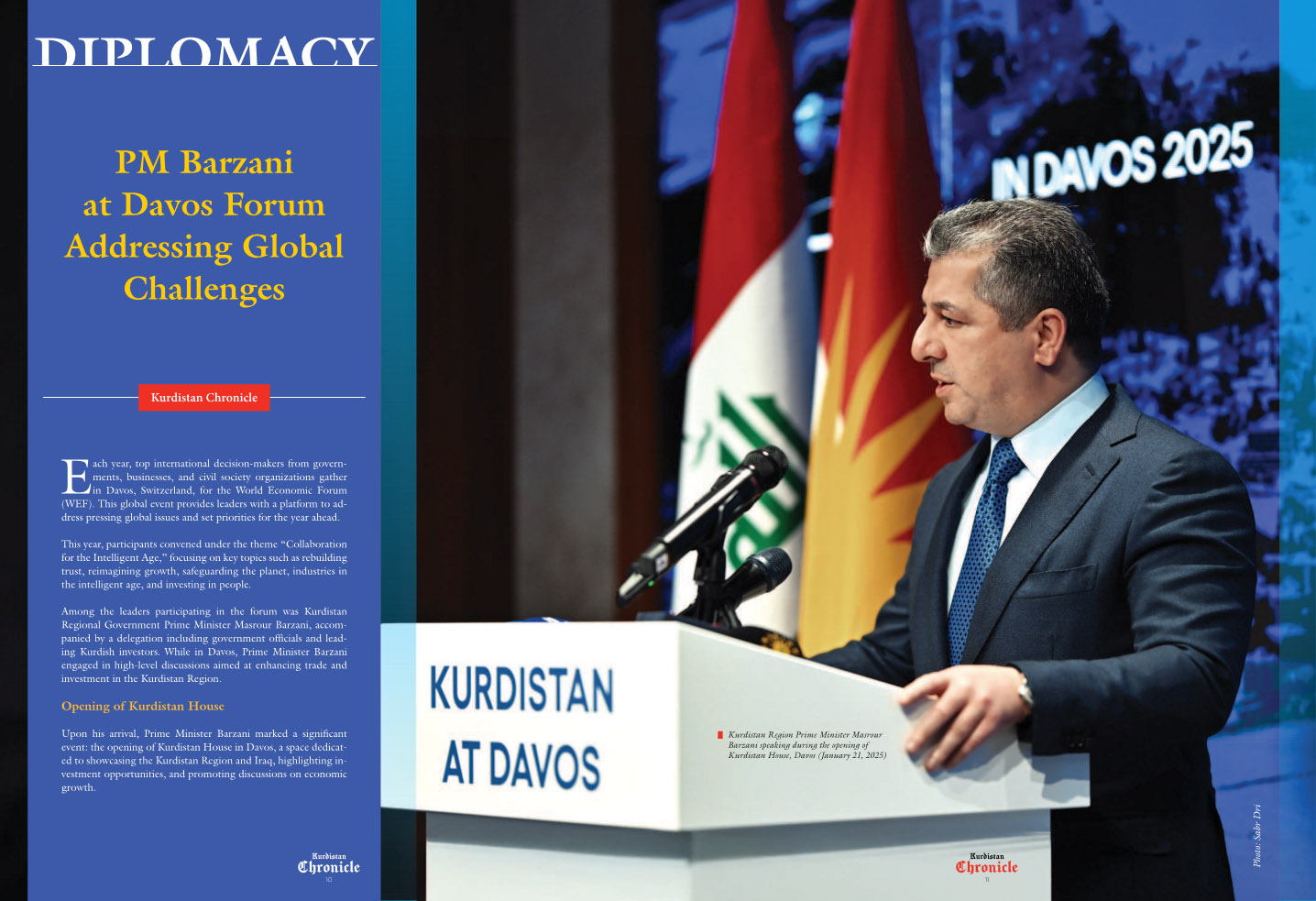
Financial Disputes Between Erbil and Baghdad: More Than Just Oil Revenues (Pages 16-18)
The issue delves into the ongoing economic and political disputes between Erbil and Baghdad, emphasizing that the struggle extends beyond financial allocations.
The coverage, written by Sardar Sattar under the headline of “Erbil-Baghdad Financial Disputes Only Scratch the Surface” explains how the Kurdistan Regional Government (KRG) continues to fight for its constitutional rights within Iraq’s federal system, including budgetary entitlements, Peshmerga funding, and the implementation of Article 140, which concerns the fate of disputed territories.
KRG Prime Minister Masrour Barzani has pushed back against Baghdad’s failure to deliver public sector salaries, with negotiations revealing deep political undertones rather than purely economic concerns. The article argues that the financial crisis is part of a broader struggle over autonomy and governance—one that will define the Kurdistan Region’s political future.
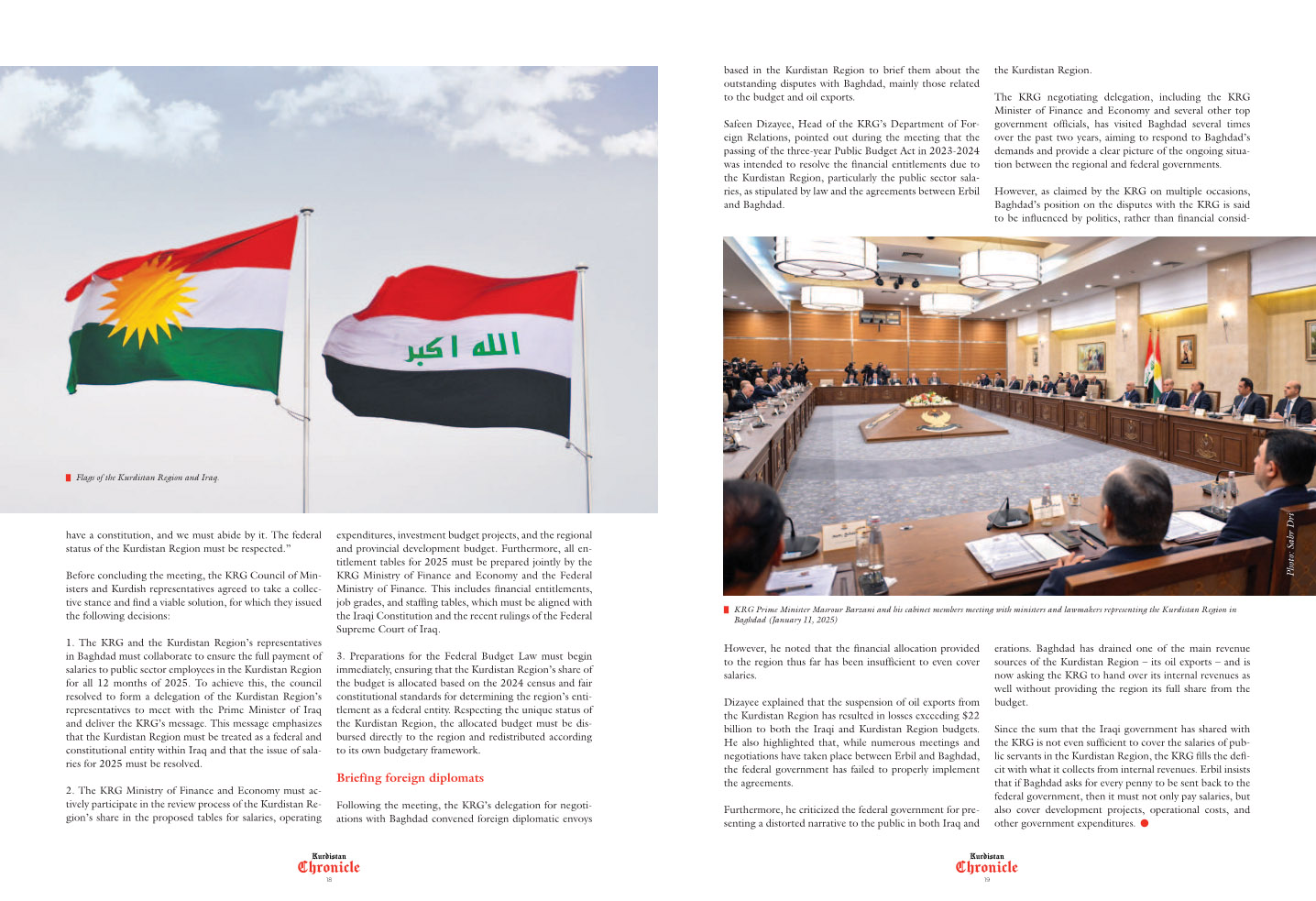
Türkiye’s Diplomatic Vision for Stronger Kurdistan Relations (Pages 20-25)
An exclusive interview with Türkiye’s Consul General in Erbil, Erman Topçu, sheds light on the deepening economic and political ties between Kurdistan and Türkiye.
The discussion covers trade relations—Türkiye being Kurdistan’s largest investor—as well as strategic cooperation on border security, energy exports, and political stability.
Türkiye’s diplomatic stance underscores a mutual interest in sustaining economic growth and preventing security threats along shared borders, particularly regarding the PKK’s presence in the region.
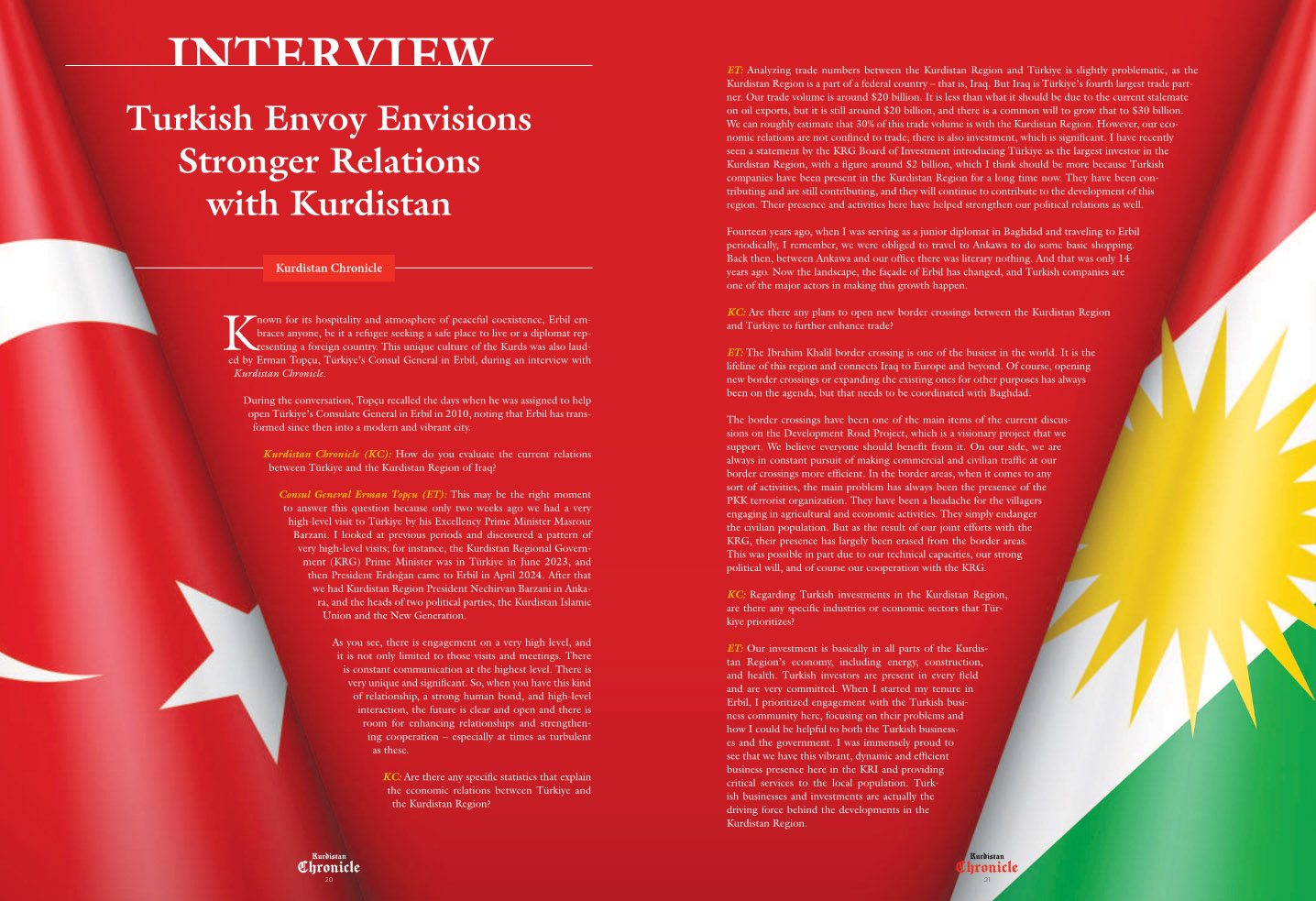
The Netherlands' Enduring Military Support for Kurdistan (Pages 26-31)
Dutch Defense Minister Ruben Brekelmans' visit to the Kurdistan Region underscores the continued need for international military presence in Iraq.
The article, written by Wladimir van Wilgenburg titled “Dutch Defense Minister Sees Continued Need for Military in Iraq”, highlights Dutch military advisors' role in Peshmerga reform and the ongoing necessity of counter-terrorism measures against ISIS remnants.
The Netherlands, a key partner in the multinational coalition against ISIS, views the Kurdistan Region as a strategic partner in maintaining regional stability.
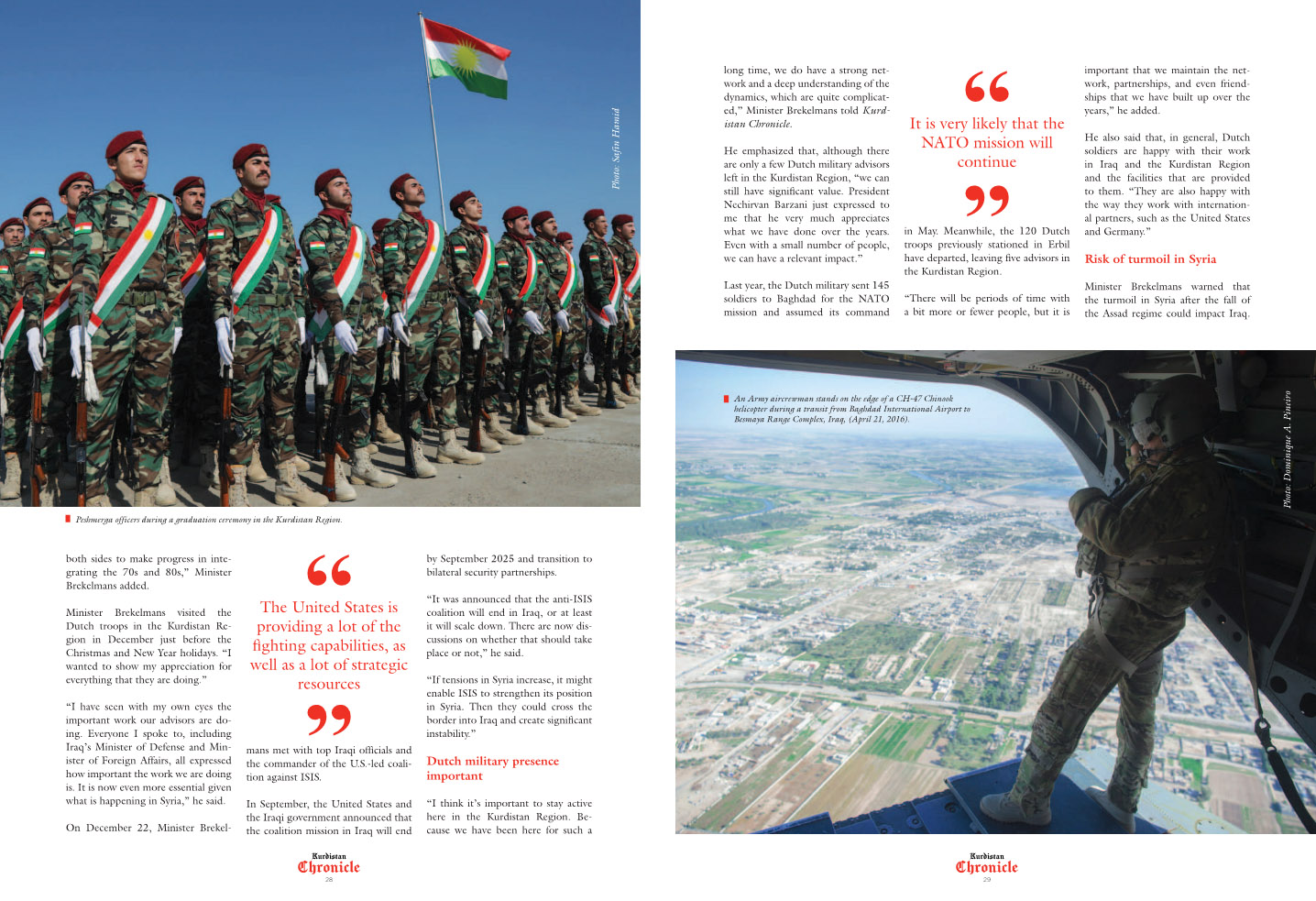
The Role of the Kurds in Post-Assad Syria: Shamal Abdulla (Pages 32-35)
Following the fall of Syrian President Bashar al-Assad in December 2024, Kurdistan Chronicle explores how Kurdish political forces in Syria are navigating the new geopolitical landscape.
With the Kurdish-led Syrian Democratic Forces (SDF) playing a critical role in recent years, the article discusses how Kurdish leadership in Erbil is engaging with Syrian Kurdish factions to secure Kurdish political rights in a restructured Syria.
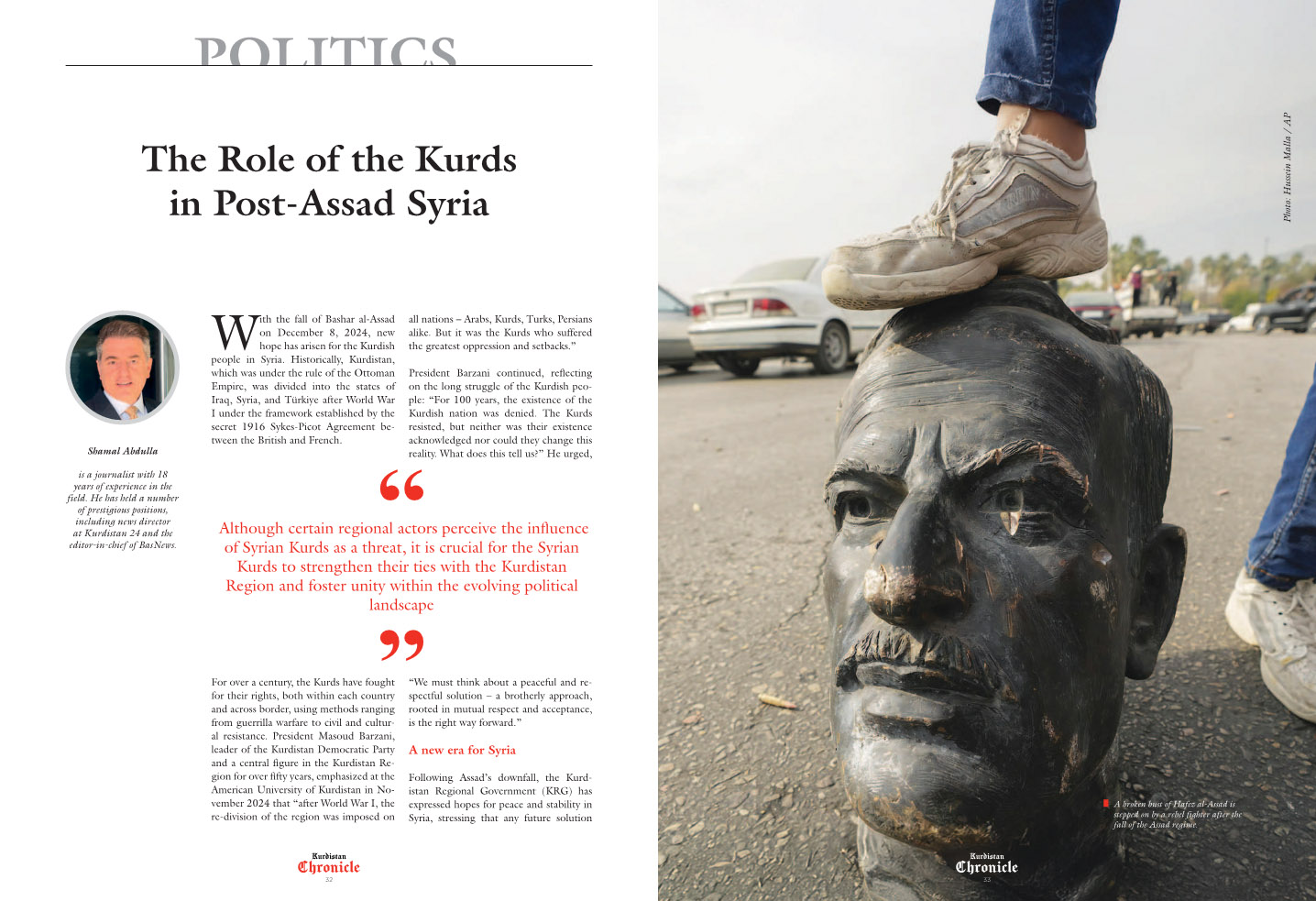
Kurdish Diaspora: From the UK to Minnesota
The Fifteenth Anniversary of Kurds for Labour (Pages 36-37)
The Kurdish community in the United Kingdom has played a significant role in the Labour Party’s recent electoral success. At an event in London, prominent Labour figures and Kurdish activists celebrated the 15th anniversary of "Kurds for Labour," emphasizing the political mobilization of Kurds in British society.
The event also touched on UK-Kurdistan relations, with calls for increased British engagement in Kurdistan’s political and economic affairs.
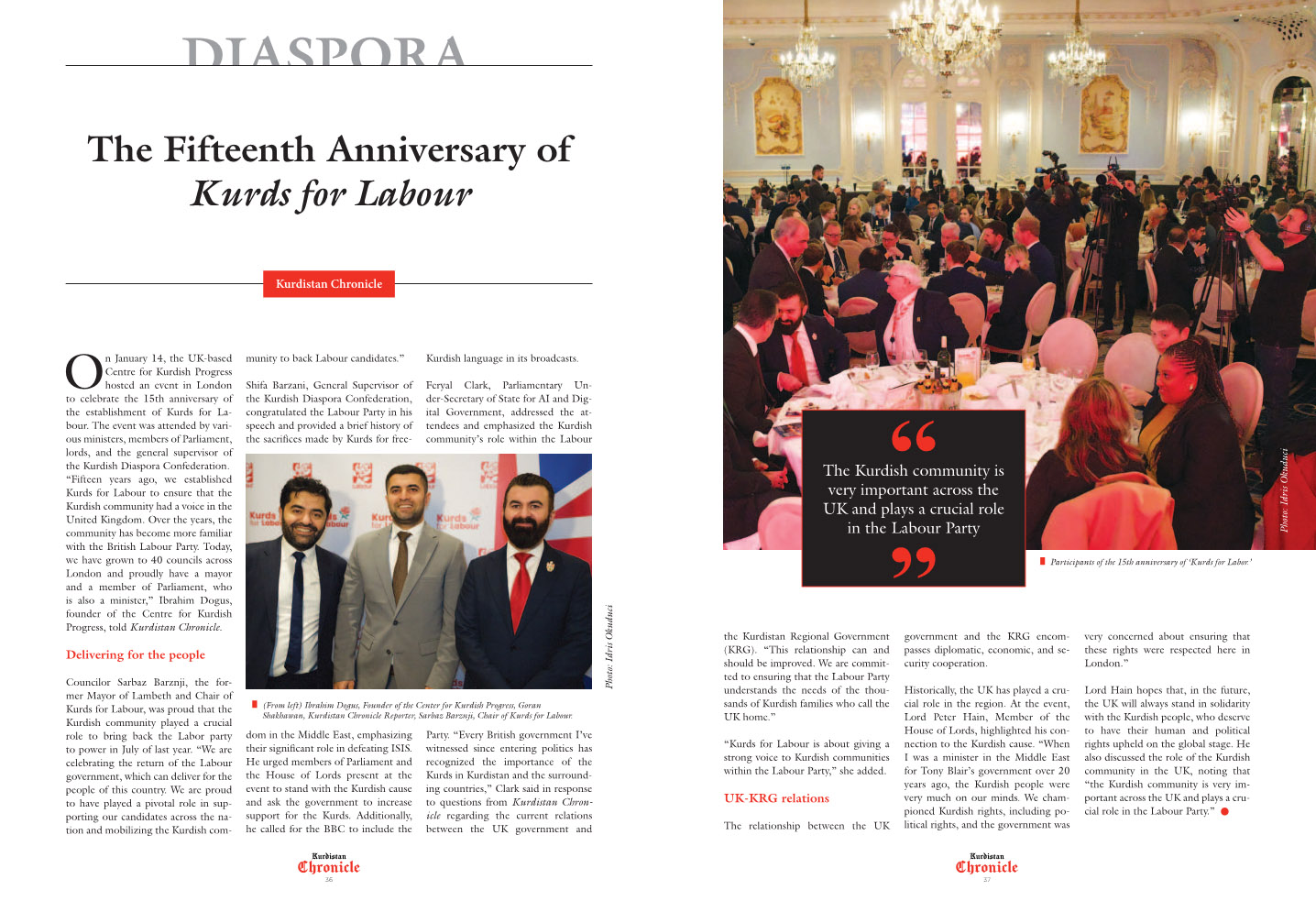
How Kurds are Transforming Moorhead, Minnesota (Pages 38-41)
A compelling feature on Kurdish immigrants in Moorhead, Minnesota, showcases how Kurds have shaped the local economy and cultural scene.
With a growing community of over 4,000 Kurds, the city has become a microcosm of Kurdish resilience and adaptation. From local businesses to community initiatives, Moorhead’s Kurdish diaspora is thriving while preserving its cultural heritage.
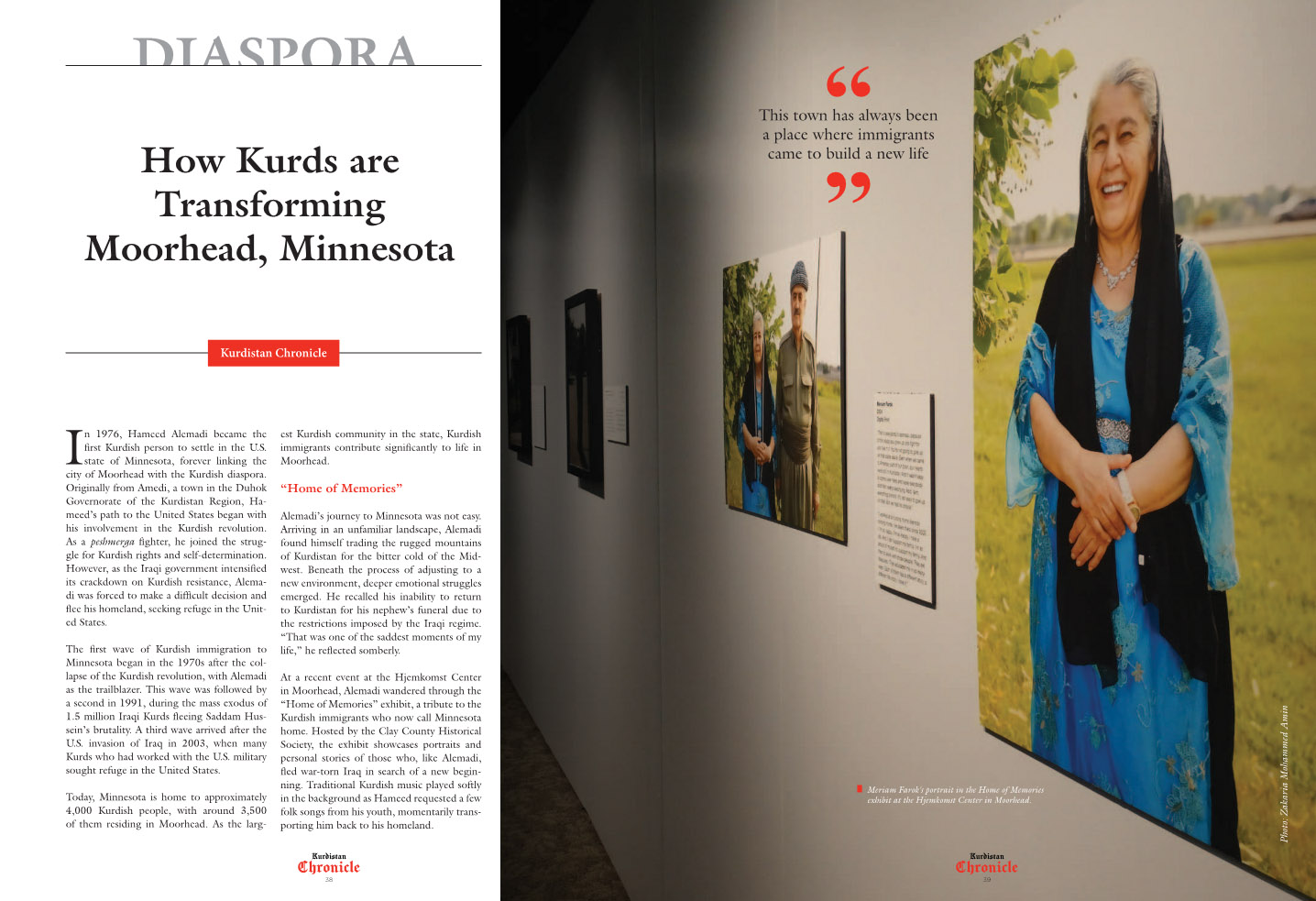
A Deepening Drug Crisis in Iraq (Pages 42-45)
In a section written by Rawisht Rasheed and titled “Drug Epidemic in Iraq and Beyond”, the author delves into what he calls “drug epidemic” in Iraq.
This issue takes an investigative turn with a report on the rising drug epidemic in Iraq and the Kurdistan Region. The UN’s latest figures indicate a sharp rise in substance abuse, with Iraq serving as a transit hub for narcotics smuggling between Asia, the Middle East, and Europe.
In response, the Barzani Charity Foundation, in collaboration with international partners, has launched Kurdistan’s first drug awareness and rehabilitation center.
The project aims to combat addiction through awareness campaigns, medical treatment, and reintegration programs.
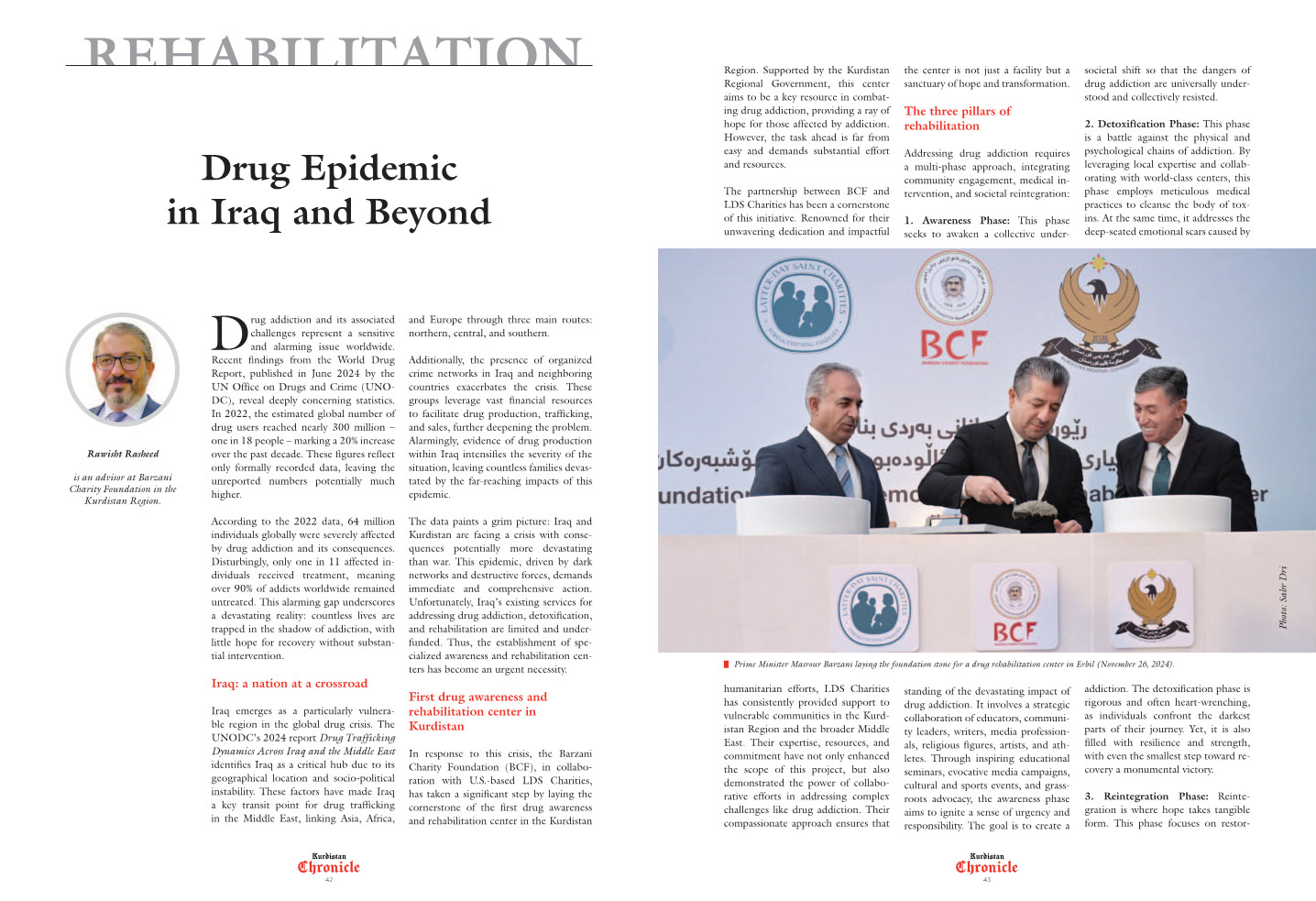
Cultural Highlights: From Ancient Traditions to Modern Art
Pir Shalyar’s Message: A Timeless Tradition of Unity and Sacrifice: Nasih Ali Khayat (Pages 62-67)
A rich historical feature explores the ancient Pir Shalyar festival, an event symbolizing sacrifice and communal unity in Kurdish folklore. Held in Hawraman, Kurdistan, the festival is a testament to the region’s deep-rooted cultural heritage.
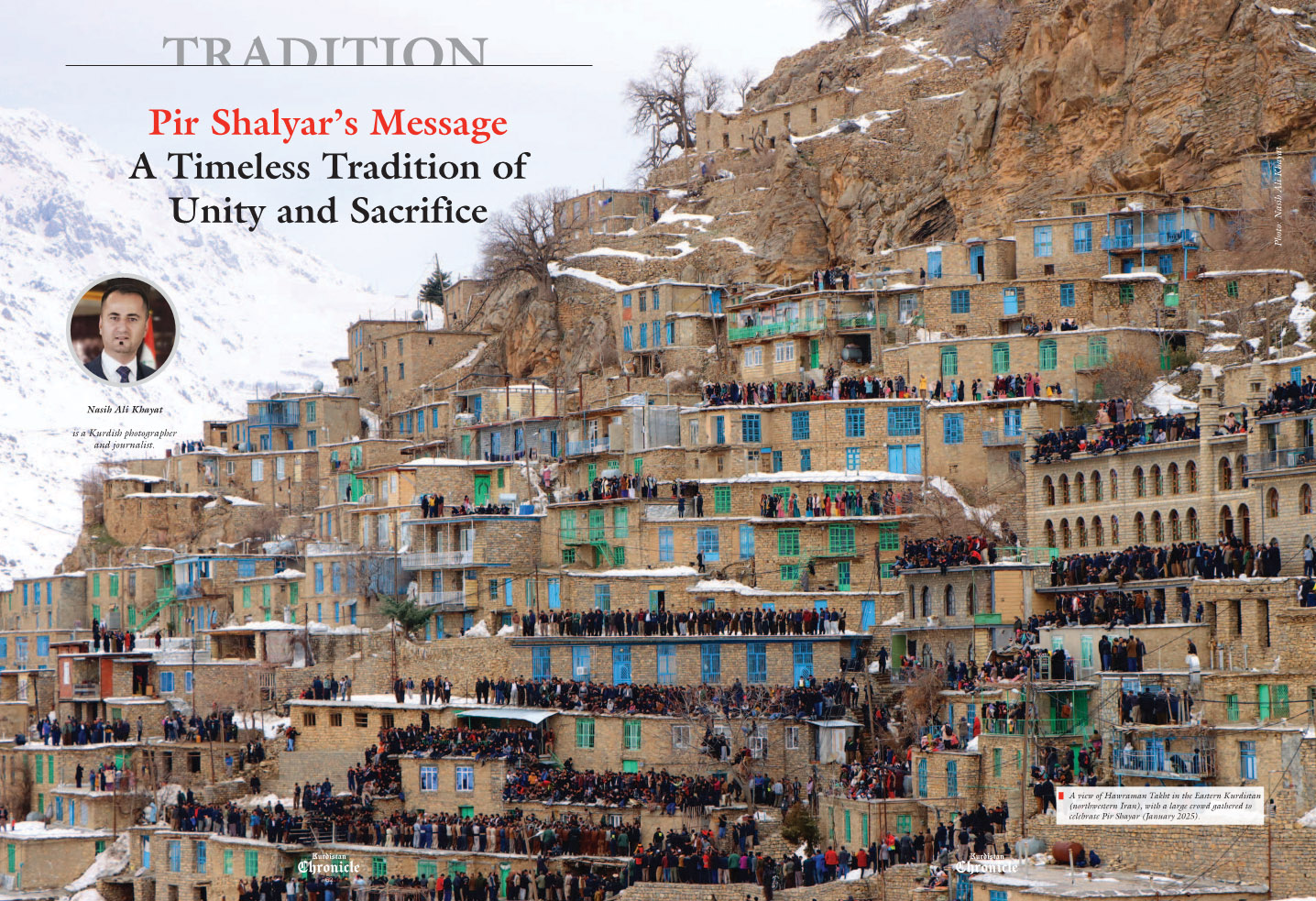
Duhok International Film Festival: Mohammad Dargalayi (Pages 92-97)
The Kurdistan Chronicle celebrates the growing success of the Duhok International Film Festival, which continues to provide a platform for Kurdish and international filmmakers. This year’s festival emphasized themes of resilience, exile, and identity, with a strong focus on Kurdish cinema’s role in global storytelling.
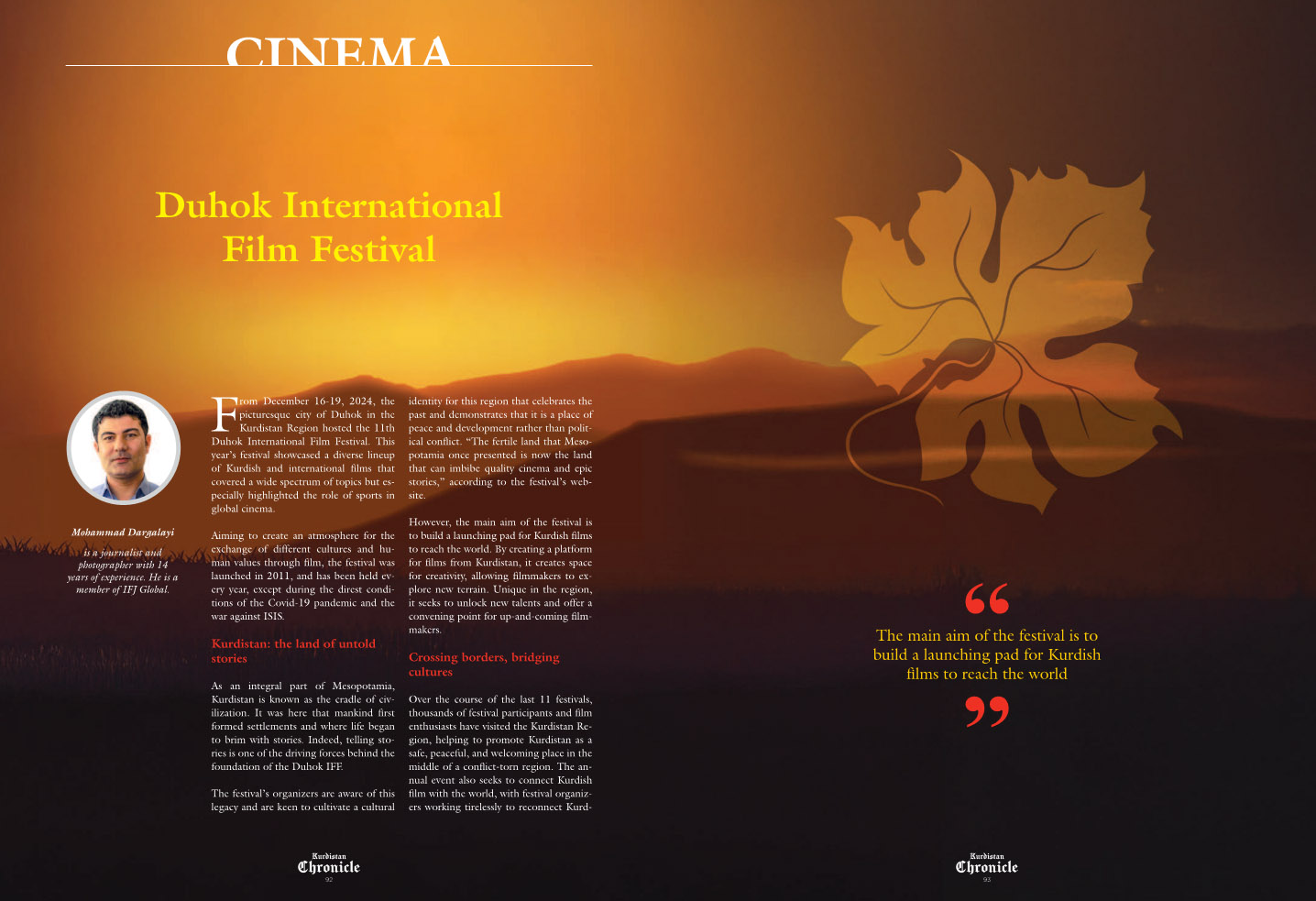
Final Thoughts: A Chronicle of Resilience and Progress
Kurdistan Chronicle’s 22nd issue masterfully weaves together the narratives of political engagement, economic strategy, and cultural heritage.
From Prime Minister Barzani’s diplomatic efforts in Davos to the struggles of Kurdish communities worldwide, the magazine captures the pulse of the Kurdistan Region in 2025. This issue is not just an insight into the present challenges and triumphs of Kurdistan but also a forward-looking vision of its role in regional and global affairs.